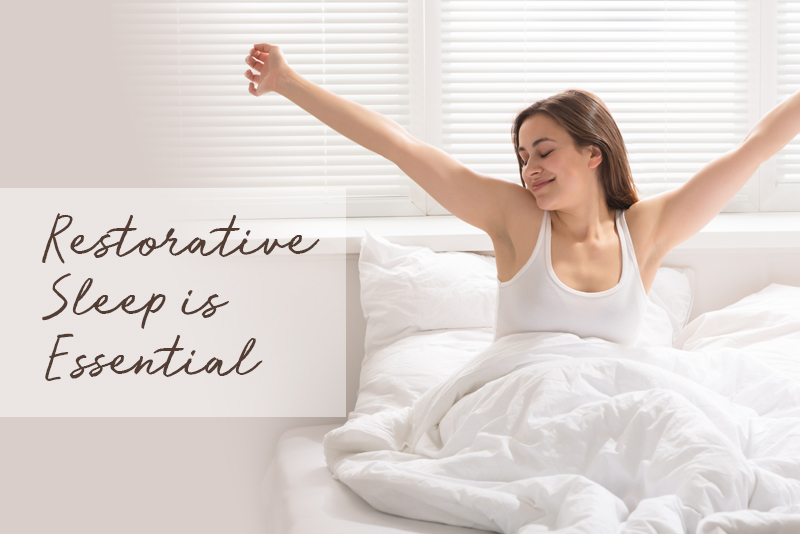By Jayashree Mani, MS, CCN
Everyone experiences an occasional sleepless night. For those with young children, sleepless nights are all too common. Isolated incidents of sleeplessness certainly can take their toll for a day or so, but what happens when lack of sleep is chronic?
The human body requires sleep to function properly. Fatigue Science reports that after one day of sleep deprivation, cognitive impairment sets in and some of these effects begin as early as 17 hours without sleep —with judgement, memory and hand-eye coordination all taking a hit.
Restorative sleep is essential!
During sleep…
- The pituitary, the master gland in the brain, releases growth hormone.
- The immune defense and repair system is most active — identifying and replacing what is worn out and identifying and recycling what is foreign and might be harmful (including abnormal cells).
According to the American Sleep Association, 50-70 million US adults suffer from a sleep disorder with both short and long-term insomnia together affecting close to 30%.
For the millions of people surviving – not thriving – due to a lack of restorative sleep, relief may be found in these 8 simple “physiology before pharmacology” tips.
- Start with enhanced uptake tryptophan with B6 and zinc to enrich serotonin and enhance melatonin production in a natural, physiological way. Take 30 minutes before retiring for the night. We do not recommend systemically flooding the body with synthetic neurochemicals present in medications. We recommend physiology before pharmacology. See PERQUE Sleep Guard™.
- Lack of restorative sleep can often cause an imbalance in the body’s neurochemical harmony. This can precipitate anxiety and/or periods of depression. Try taking amino acids such as free l-methionine and glycine along with magnesium aspartate to address this situation. See PERQUE Mood Guard™.
- Incorporate relaxing rituals like salt & soda baths with calming essential oils. Other modalities include abdominal breathing, active meditation to link relaxation response with breath, and dichromatic green light for 20 minutes prior to bed.
- Keep electronic devices out of the bedroom. Avoid looking at phones, computers or tablets right before attempting to fall asleep. Some even find value in turning off routers and other sources of electromagnetic fields at night.
- Sleep in a room as dark as possible. Falling asleep with the television on is not a good way to get the best night’s sleep.
- Do not eat within three hours of retiring for the night. Eat foods that can be digested, assimilated, and eliminated without immune burden. Delayed allergy burdens can interfere with restorative sleep rhythms.
- Avoid caffeinated drinks after lunch and stay hydrated with water and alkalinizing beverages instead.
- As you fall asleep, see yourself receiving inspiration, insight, and guidance during the restorative sleep ahead.
Did you enjoy this post? We post new content regularly! Click here to see our latest blog posts.


